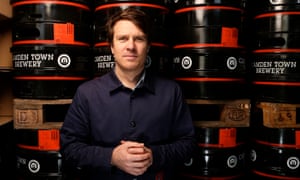
The craft beer brand Camden Town Brewery is to put its independent image on the line after agreeing to be bought by the global drinks giant AB InBev.
The UK brewer said it had accepted a takeover offer from the world’s biggest drinks company in order to fund international growth plans.
The deal, worth about £85m, adds Camden’s niche Hells, Pils and Pale Ale brands to a stable that includes mass-market offerings such as Budweiser, Stella Artois and Beck’s.
But the takeover drew immediate criticism from craft beer purists, many of who view the major brewing companies with suspicion.
James Watt, founder of craft beer group Brewdog, rounded on his rival for selling out to a global behemoth of the drinks industry.
He said Brewdog would no longer stock any Camden Town beers in its bars because it does not sell drinks made by AB InBev.
Long-time fans of Camden Brewing Company also expressed their disappointment.
Twitter used @missjademusic simply asked: “Why Camden Brewery!?!? WHY!!!”
Global brewers such as AB InBev, which is about to buy its nearest rival SAB Miller, for more than £70bn, have faced a growing challenge from craft beers made by independent firms.
And they have responded either by launching rival offerings borrowing the imagery and language of challenger brands, or simply buying them out.
Peroni and Grolsch owner SAB Miller snapped up Camden’s rival Meantimeearlier this year, while Diageo used its Guinness brand as a launchpad for a series of ales and porters.
Carlsberg has also launched a range it calls Crafted in a bid to capture the more discerning beer drinker.
AB InBev did not disclose how much it paid to get its hands on Camden Brewing Company.
But Camden’s own crowdfunding website suggests it was worth around £50m at the time of a fundraising exercise which closed in July.
A letter to shareholders about the latest deal revealed they were being offered between £1.0861 and £1.2526 per share, depending on whether they accept an option with a variable element based on sales growth. Reports said this was a return on investment of just under 70%, implying that AB InBev paid around £85m.
The founder of Camden Town Brewery, Jasper Cuppaidge, told the Guardian that investors should be “ecstatic” that the shares had been bought at a premium.
Cuppaidge, his family and three best friends own 95% of the company’s equity, suggesting that they have shared a combined payout of more than £80m.
The company’s latest accounts, for the year to the end of 2014, show a pre-tax profit of £319,000 on revenues of more than £9.5m.
Cuppaidge said the businesses now need a major investor to increase sales by funding the construction of a second brewery that will create 30 jobs.
He insisted that being bought by a large brewer would not force the company into brewing a more generic version of its brands.
“AB InBev are investing to build a new brewery to our exact standards, so I can continue to make great beer. They’re not making a beer for us.
“To stay at the forefront of this movement and secure our future success, we have to build a bigger brewery, employ more people and gain access to an international distribution network,” he said.
“We can’t do this on our own.”
He compared the company to smoothie maker Innocent, whose founders also decided to sell up after a blockbuster offer.
“You only have to look at brands such as Innocent … They’ve gone from strength to strength by joining up with Coca-Cola,” he said.
But a question and answer session in which Cuppaidge took charge of thecompany’s Twitter account invited some less than enthusiastic comments.
Cuppaidge founded Camden Town Brewery in 2010 with just three staff. He has since built it into a well-known staple of London pubs, selling 12 million pints in 2015 from more than 1000 pubs, bars and restaurants.
Iain Newell, European director of craft beers at AB InBev, said: “We have a passion for great beer.
“Camden Town is a creative business with a great range of brands that will complement our existing portfolio.”
Mark Benner, managing director of the Society of Independent Brewers (Siba) said: “As craft beer continues to grow in popularity and steal market share we are likely to see more global brewers looking to take over craft breweries, something which makes membership to Siba even more important for breweries looking to differentiate themselves, as consumers look to seek out truly independent craft brewed beers.”
[Source:- the gurdian]
